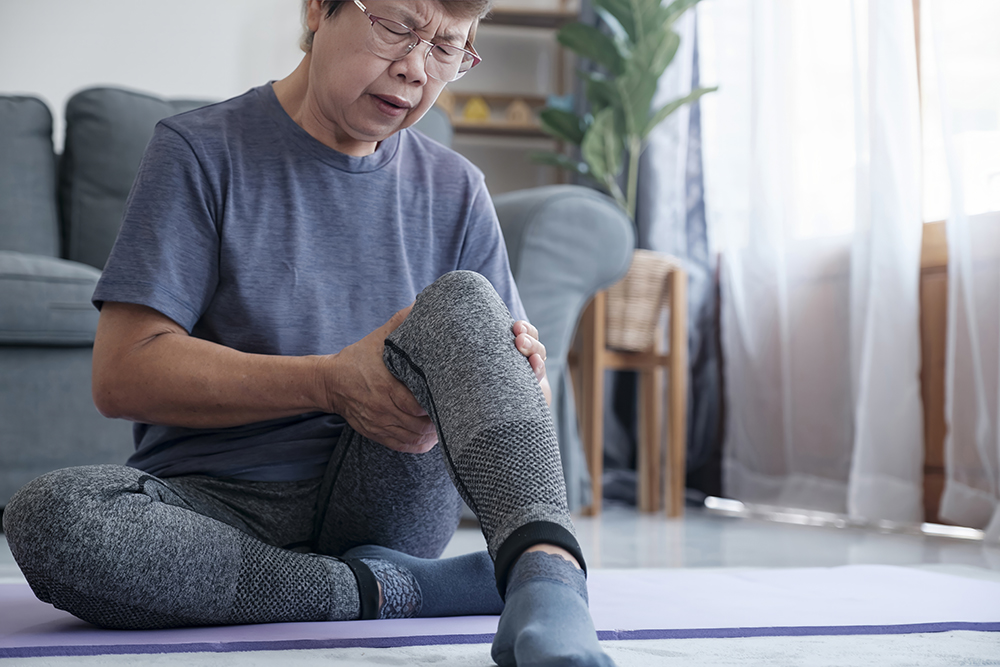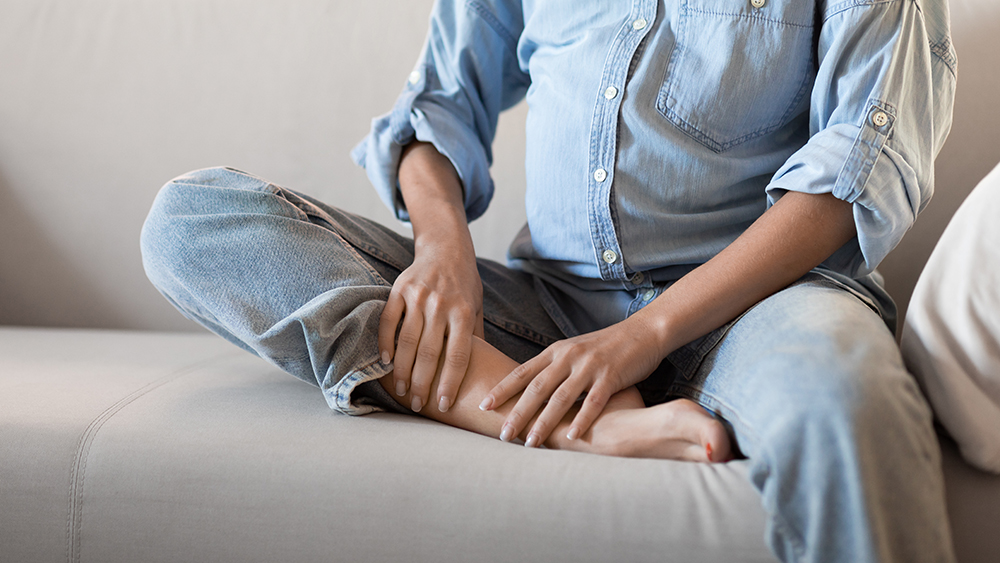Contents
If you have ever tossed and turned all night, yearning for sleep but plagued by leg pain, you’re not alone. Leg pain at night is surprisingly common and can affect people of all ages and activity levels. You may experience discomfort that can range from a dull ache to a sharp pain, cramping, aching, or even a tingling sensation. While the discomfort can be unpleasant, the cause of your pain doesn’t have to be an unknown nuisance.
Potential culprits behind your leg pain when lying down
The cause of your leg pain when you’re lying down can be as varied as the people who experience leg pain. Some common culprits can include:
- Muscle cramps — Muscle cramps at night can be sudden, involuntary muscle contractions that can affect up to 60% of adults. These contractions can be extremely painful and often affect the calves, but can also hit the thighs or feet. Cramps can be triggered by dehydration, electrolyte imbalance or simply overexertion during the day.
- Restless leg syndrome — Restless leg syndrome is a neurological condition that affects up to 10% of the U.S. population and causes an irresistible urge to move your legs. It can creep up at night while you’re resting. The sensation can be described as a tingling, crawling sensation or even an achy discomfort that can ease with some movement.
Musculoskeletal issues — Problems with the bones, muscles and connective tissue in your legs, like herniated discs, spinal stenosis, joint or muscle strains or tears, can contribute to leg pain when lying down.
- Gout — Gout is an inflammatory condition that can cause sudden and severe pain in the joints. It often affects the big toe but can also impact the knees and ankles. Gout pain can be particularly intense at night.
- Pregnancy — Around 40% of women experience leg cramps, aches and swelling in their legs during pregnancy due to hormonal changes, increased blood volume and pressure on the veins.
- Diabetic neuropathy — People with diabetes can experience nerve damage (neuropathy) that can cause burning, tingling or numbness in the legs, which can be worse at night.
- Arthritis — Inflammation in the joints, like osteoarthritis in the knees or hips, can cause pain that gets worse at night. The stiffness that can be associated with arthritis can make it hard to find a comfortable sleeping position.
- Peripheral artery disease (PAD) — PAD is a condition characterized by the narrowing of the arteries in the legs. PAD can cause leg pain, cramping or a heaviness in your legs, especially when you’re lying down or your legs are elevated. This can be because your legs aren’t getting enough circulation.
- Sciatica — Sciatica starts in the lower back when the sciatic nerve, the longest nerve in the body, is irritated or compressed. This pain can radiate down the back of one leg, sometimes reaching your foot and causing discomfort while lying down.
Treatments for leg pain when lying down
The good news is that there are several different treatments that can help relieve leg pain when lying down, depending on the underlying issue. Some ways to help relieve pain include:
- Hydration and electrolytes.
- Heat therapy.
- Compression.
- Regular exercise.
- Elevation.
- Medication.
- Physical therapy.
- Surgery, in severe cases.
Physical therapy techniques for leg pain when lying down
Leg pain when lying down can rob you of quality sleep. Physical therapy can be a beneficial treatment to address the underlying cause and help you find relief. A physical therapist can assess your specific condition and design a personalized treatment plan that may include:
- Manual therapy — Manual therapy techniques like joint mobilization, soft tissue manipulation and trigger point therapy are hands-on techniques that can help improve pain, mobility and function. Physical therapists with a Certification in Orthopedic Manual Physical Therapy (COMT) can also use the most effective manual therapy techniques for your underlying issue. Joint mobilization is a technique where your physical therapist uses gentle, controlled movements applied to the joints in your legs and spine, helping improve flexibility and range of motion. It can be beneficial for conditions like arthritis that can make finding a comfortable sleeping position difficult. Soft tissue manipulation is a technique where your physical therapist will apply sustained pressure and strokes to various soft tissue like muscles, ligaments and fascia. It can help reduce muscle tension and tightness, boost circulation, promote healing, and reduce pain. Trigger point therapy focuses on identifying and deactivating trigger points, which are small, hypersensitive areas within muscles that can cause referred pain. By applying pressure to these trigger points, your physical therapist can help alleviate pain and improve muscle function.
- Therapeutic exercises — Your physical therapist may create a personalized therapeutic exercise routine that incorporates stretching and strengthening exercises. These exercises will target the areas most relevant to your specific leg pain. Stretches can help improve flexibility and prevent muscle cramps. Strengthening exercises can help improve your overall stability and support, which can help reduce strain on your joints. Therapeutic exercises can help manage pain from arthritis, muscle weakness and other musculoskeletal issues.
- Aquatic therapy — Aquatic therapy uses the buoyancy of water to help reduce stress on your joints and muscles. This can help promote relaxation and minimize pain. The resistance of water during gentle exercises can improve your flexibility and range of motion in your legs with low-impact strengthening. Aquatic therapy can be helpful for arthritis, tendinitis, muscle cramps and PAD.
Leg pain when lying down can be a frustrating and sleep-disturbing issue; Lattimore PT can help
At Lattimore Physical Therapy, we understand the challenges leg pain when lying down can present. We recognize there’s a multitude of potential causes; that’s why our dedicated team always takes a personalized approach to treatment. Through a thorough assessment, we can help identify the root of your leg pain and create a customized treatment plan. By addressing the underlying cause, we can help you find relief and reclaim a restful night’s sleep.
Contact our team today for more information or to schedule an initial appointment.



